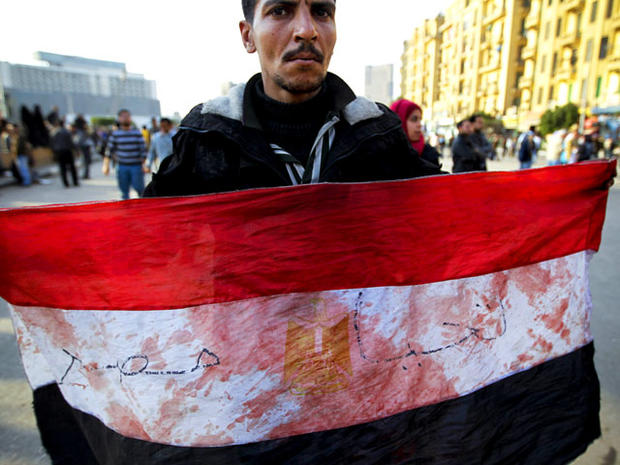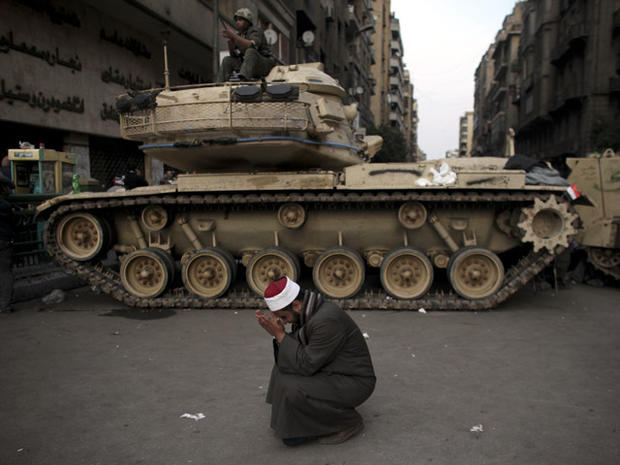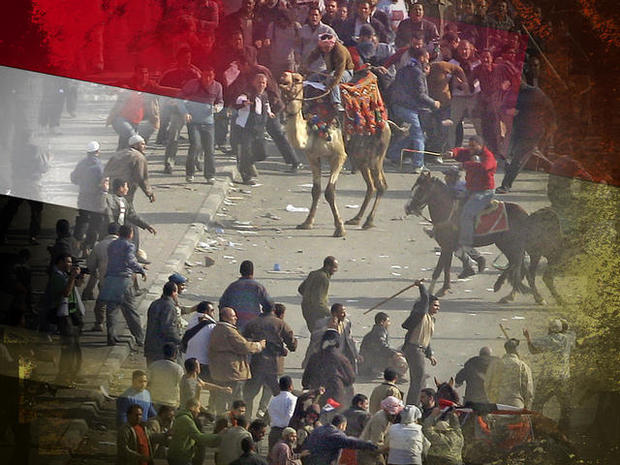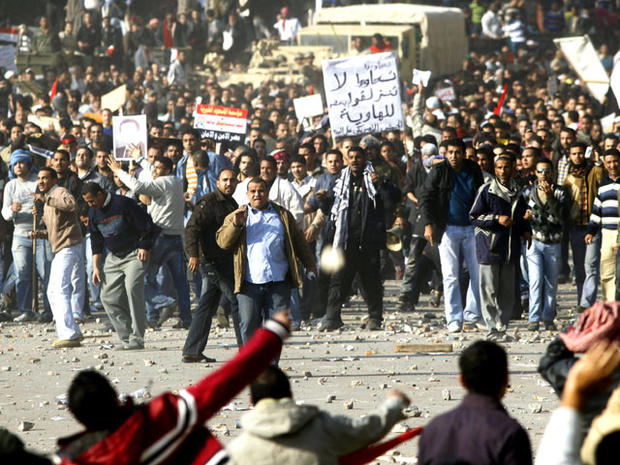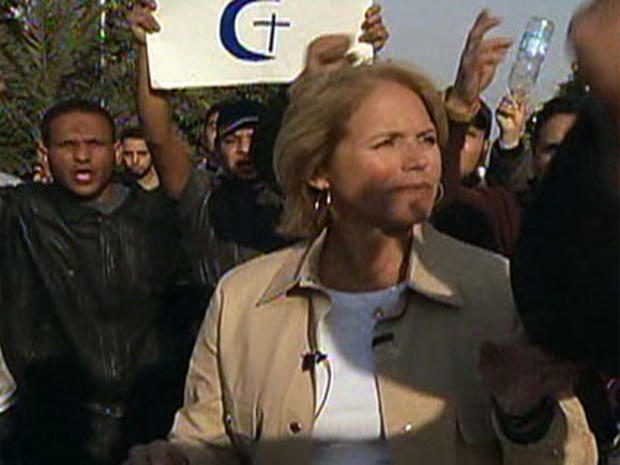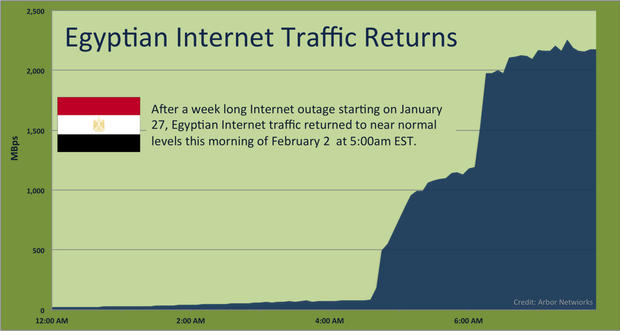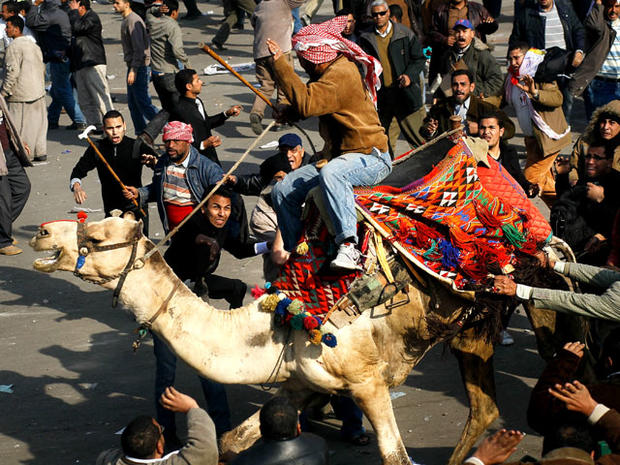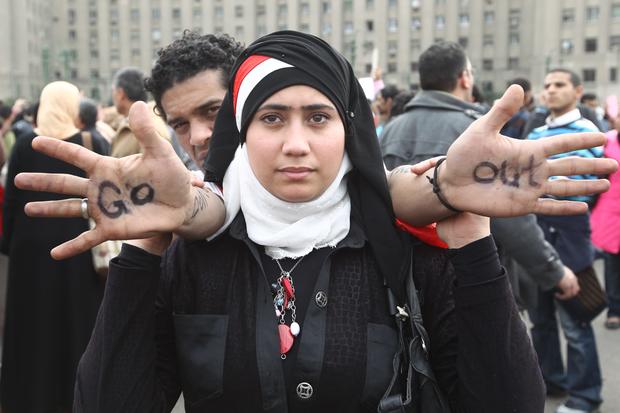Live Blog: Egypt in Crisis, Day 9
For the ninth straight day, protesters are swarming the streets of Cairo demanding President Hosni Mubarak step down and end his 30-year rule. Our blog covers the latest news out of Egypt.
Day 10 Coverage of Egypt in Crisis
Day 8 Coverage of Egypt in Crisis
Complete Coverage: Anger in the Arab World
11:50 p.m. Al Jazeera reports now that five people have been killed since the gunfire started in Cairo. (Note: Link is to live video page.)
11:21 p.m. The State Dept. issues a new statement on the status of U.S. citizen evacuations from Egypt. It reads in part: "The welfare and safety of U.S. citizens in Egypt remains one of the State Department's top priorities. More than 1,900 U.S. citizens and their family members have been evacuated from Egypt in an operation that began on Monday, January 31. We plan to continue evacuation efforts on Thursday, February 3, and are assessing the need to continue flights after that."
It continues: "We advise U.S. citizens to avoid demonstrations and carefully proceed to the airport during non-curfew hours. U.S. citizens with passports that expired within the past 10 years may go directly to the airport. Persons with passports that expired more than 10 years ago, should go to the Embassy to obtain a replacement. Read the entire update at the State Dept. website.
10:50 p.m. State Dept. revises its instructions to Americans in Cairo, tweeting: "REVISION: U.S. citizens WISHING to depart #Egypt on USG flight should proceed to airport asap AFTER the morning end of curfew."
10:39 p.m. Al Jazeera reports four people have been killed since the gunfire started in Cairo. (Note: Link is to live video page.)
10:18 p.m. U.S. State Dept. tweets: "U.S. citizens wishing to depart #Egypt on USG flight should proceed to airport ASAP after the morning end of curfew."
10:05 p.m. The Associated Press reports bursts of heavy gunfire are ringing out in Cairo's Tahrir Square, and a protest organizer says three anti-government demonstrators have been killed. Read the story here.
Ibrahim Kamel, general secretariat of Mubarak's administration, praised the new wave of pro-government protesters and dismissed the protesters demanding change.
"I am sorry to say that these people that are standing in the square are not Egypt or the Egyptians," Kamel told Couric.
(Watch at left)
"All of us are Khaled Said because all of us might face the same destiny at any point in time," said one man, who would only speak to CBS News if his identity was hidden. He is one of the key organizers of the protests that have rocked Egypt.
8:30 p.m. ET After Egypt's brutal riot police melted away last Friday and the Army rolled in, they were embraced as protectors, CBS News Correspondent Elizabeth Palmer reports.(Watch at left)
The largest military in the Arab world gets about a third of its money -- $1.3 billion in 2010 -- from the United States. It hasn't actually been in combat since 1973, when Egypt fought a war against Israel.
(Watch at left)
"Because all what you do is give that regime a legitimacy, which in my view, they have lost," ElBaradei said. "But more importantly - I don't think he understand what democracy means. I don't think he understands that he really needs to, you know, let go."
(Watch at left)
"Throughout much of Mr. Mubarak's 30 years of rule, he tried to portray himself as the person who stood between Egypt and chaos or between Egypt and an Islamic alternative," Haass told Couric. "So the sort of violence we've seen today, while some of it may have been spontaneous, the idea that some of it may have been orchestrated by the president and his supporters, should not come as any surprise."
6:39 p.m. ET Reports have surfaced that preparations are being made for a dawn assault Thursday on protesters in Cairo's Tahrir Square, CBS News' Khaled Wassef reports. Dawn is expected to break in Cairo at 6:44 a.m. local time Thursday, 11:44 p.m. ET Wednesday. Protesters have called for Egyptian President Hosni Mubarak to step down Friday.
6:26 p.m. ET CBSNews.com Editor-in-Chief Dan Farber explores how, on the one hand, the Mubarak government Wednesday gave Egyptians the technology to communicate around the world and organize protests. On the other hand, Mubarak allies deployed military forces, or agents roaming the streets, to shut down the free press--Al Jazeera, Al Arabiya, CNN, NBC, CBS, ABC, BBC and others trying to cover the intensifying story in Egypt. Read More
6:07 p.m. ET Journalist Belal Fadl told Al-Jazeera television that the family of a missing Google marketing director has received "terrorizing" phone calls in the middle of the night, CBS News' Khaled Wassef reports.
Wael Ghonim, Google's marketing director for the Middle East, has been missing for days in Egypt. His brother, Hazem Ghonim, told Fadl that the family has been called during the middle of the night and told that Ghonim is being "taught a lesson".
Al-Jazeera reported earlier Wednesday that youths in Cairo's Tahrir Square nominated Ghonim as their spokesman.
Google released a statement Wednesday that the company doesn't have any new information on Ghonim.
5:46 p.m. ET Secretary of State Hillary Rodham Clinton has spoken with Egypt's new vice president to urge an investigation into Wednesday's violent clashes, the Associated Press reports.
She's apparently the first Cabinet-level official to reach out to Omar Suleiman, a longtime confidante of the U.S.
State Department spokesman P.J. Crowley says Clinton condemned the violence and told Suleiman the government should hold to account those responsible.
Crowley said the U.S. does not know who unleashed what he called "thugs." He called the clashes a clear attempt to intimidate protesters.
5:28 p.m. ET CBS Radio News Correspondent Cami McCormick reports that U.S. envoy Frank Wisner, reported as the American who conveyed a message from President Obama to Egyptian President Hosni Mubarak that he shouldn't run for re-election, is flying home Wednesday night.
5:17 p.m. ET Zachariya Shalash, chairman of the Egyptian court of appeal, told Al-Jazeera television that Egyptian President Hosni Mubarak could be tried for crimes against humanity the "butchery" against protesters that took place during clashes in Cairo's Tahrir Square Wednesday, CBS News' Khaled Wassef reports.
5:06 p.m. ET Egyptian Health Minister Ahmed Sameh Farid told The Associated Press that three people have died and more than 600 were injured in the clashes.
Farid said that two young men were brought out of Tahrir Square in ambulances, one already dead and another who later died at the hospital from injuries. He did not specify the injuries.
It was not clear whether they were government supporters or anti-Mubarak demonstrations.
The third fatality was a man who fell from a bridge near the square amid the chaos. Farid said the man was in civilian clothes but may have been a member of the security forces. The health minister said at least 611 people have been injured in the fighting.
4:39 p.m. ET: Recently released footage by the Assocaited Press from earlier in the day of protesters clashing in Tahrir Sqaure in Cairo. WARNING: GRAPHIC VIOLENCE
4:29 p.m. ET: The Associated Press is reporting that a loose international group of hacker activists says it is attacking Egyptian government websites, taking them offline soon after the country restored Internet service Wednesday. An Internet forum run by the group "Anonymous" directs participants to attack the websites of the Egyptian Ministry of Information and the ruling National Democratic Party. Neither was accessible from New York on Wednesday afternoon.
4:14 p.m. ET: The Committee to Protect Journalists has released a startling list of journalists attacked in Egypt today. Among them include an Al-Arabiya correspondent, CNN's Anderson Cooper, at least two Associated Press reporters, a Danish TV journalist, and an Icelandic TV journalist. There were also several reports of Egyptian independent media offices being raided and shuttered. Read CBS News' full story on attacks on journalists and journalism.
4:10 p.m. ET: Former Republican presidential candidate and Ariz. Senator John McCain tweets: "Regrettably the time has come 4 Pres. Mubarak 2 step down & relinquish power. It's in the best interest of Egypt, its people & its military."
4:00 p.m. ET: As thousands of foreigners clog Egypt's airports attempting to flee the rising instability and violence, several countries have stepped up efforts to get their citizens out, including Austria, China, Germany, the U.S. and Greece. Reuters has begun compiling a list of some of the measures being taken.
3:52 p.m. ET: Wired magazine is reporting that leading Egyptian social media activist Ahmed Maher, 30, has been arrested. Wired writes: "Maher gained prominence in 2008 as one of the co-founders of the April 6 Youth, a solidarity group launched to support protests. Organizing mostly online, especially on Facebook, it is a carefully decentralized network of activists, who have used the tools of social media to broadcast grievances with the Mubarak regime, mobilize support, evade the government's ubiquitous security forces, and, now, help to bring the Mubarak regime to its knees."
3:50 p.m. ET: Comedian Andy Borowitz tweets: "I know this is mean, but Mubarak is starting to sound like Al Davis."
3:40 p.m. ET: An U.S. official told CBS News that the U.S. is seeing signs that the Egyptian government is planning to use police to put down the violence. Police have been seen returning to their patrolling stations. There is still no indication that the Egyptian military will intervene. So far as is known, the military has not disobeyed any orders from its commander-in-chief, Mubarak. In other words, there is no indication he ordered them to crack down and they refused.
3:39 p.m. ET: Recently appointed Egyptian Vice President Omar Suleiman said Wednesday the government will not begin any dialogue with protesters until they return to their homes.
3:35 p.m. ET: CBS News correspondent Shira Lazar reports on tech companies that came to the aid of Egyptians after the government cut off Internet access.
3:06 p.m. ET: The White House appears to be leaning towards pushing President Hosni Mubarak to leave now, not in September as he promised, reports CBS Political Hotsheet reporter Brian Montopoli.
White House press secretary Robert Gibbs told reporters at a briefing that when President Obama spoke to his Egyptian counterpart Tuesday, "The message that the president delivered clearly to President Mubarak was that the time for change had come."
Gibbs said Mubarak now has an opportunity to show "exactly who he is" by proceeding with that transition. Pressed by reporters, Gibbs would not clarify whether "transition" meant an immediate Mubarak exit, though his comments marked the strongest signal in that direction thus far out of the White House.
Mubarak's cause to stay probably took a hit in the White House amid persistent rumors that pro-Mubarak demonstrators were either state employees or thugs paid to initiate violence against peaceful anti-government protesters and the media.
3:02 p.m. ET: CBS News correspondent Lara Logan talks about the challenges of reporting from Alexandria right now.
3:00 p.m. ET: Agence France Presse is reporting that Israeli Prime Minister Benjamin Netanyahu believes that the massive anti-government uprising sweeping through Egypt could destabilise the region "for many years." Netanyahu told the Israeli parliament that there would be a battle in Egypt between those who favoured democracy and those who wanted to enforce an Iranian-style radical Islamist system. Netanyahu said:
"There are two worlds, two halves, two views -- that of the free world and that of the radical world. Which one will prevail in Egypt? The answer is crucial to the future of Egypt, the future of the region and for us here in Israel."2:52 p.m. ET: Several hours after violent clashes began in Tahrir Square in Cairo, ambulances are finally moving in, Al Jazeera reports.
2:49 p.m. ET: Human Rights Watch reports:
"The situation at the Northern HQ of the army in Alexandria is very tense. The army has used the HQ as a detention center for all of the suspected looters and other troublemakers handed over to them by the neighborhood security committees since Friday. This is an unfamiliar role for the army, and they are clearly at a loss as to what to do. Many of the detainees are probably innocent, just caught in the wrong neighborhood without identification. The army is in a difficult position, as it has no evidence of wrongdoing by most of the detainees and no judicial system to process or release them. But they are the only functioning security institution."2:04 p.m. ET: "The army seems now to be reneging on its commitment to protect peaceful protesters," said Hassiba Hadj Sahraoui, Middle East and North Africa Programme Deputy Direcor at Amnesty International. "The fact that such violence is allowed to continue as the army stand there begs the question whether they have orders not to interfere."
2:00 p.m. ET: White House Press Secretary Robert Gibbs was asked to clarify the time frame meant in President Obama's statement Tuesday that "an orderly transition must be meaningful, it must be peaceful and it must begin now." Gibbs said: "Now started yesterday."
1:26 p.m. ET: Two Swedish journalists and four Israeli journalists have been arrested today by Egyptian soldiers, the Jerusalem Post reports. The soldiers reportedly attacked the Swedish reporters, spitting in their faces and threatening to kill them. Atlhough the Swedish reporters were released, the Israeli government is still negotiating the release of their journalists. Reports are surfacing from several outlets that Mubarak's supporters were instructed to target the press.
More dramatic video of the protests from Russian Television, including a tank being attacked with Molotov Cocktails:
12:56 p.m. ET: The official estimates from the Egyptian health ministry are that one person has been killed in Tahrir Square today and 403 injured thus far. Unofficial estimates range higher.
The Guardian is reporting that opposition figurehead Mohamed ElBaradei said he is not prepared to negotiate with "killers" and that there is "no going back" for the pro-democracy movement. ElBaradei adds: "Our determination not to hold negotiations with the government until Mubarak leaves has only been strengthened today."
12:24 p.m. ET: Wael Nawara, secretary-general of opposition Ghad party, tells the BBC: "Whatever sympathy [President Mubarak] had from us yesterday, I think this sympathy has totally dried up. We have 500 injured in Tahrir Square just because he wants to stay in power for another few months. Why can't he just step down now?"
11:51 a.m. ET: Gulf News in Dubai is reporting that at least 500 people have been wounded in clashes between demonstrators in Cairo today.
11:36 a.m. ET: The New York Times' Nicholas Kristof, on the ground in Cairo, says the violence in Cairo today was organized and initiated by pro-Mubarak forces. Kristof writes:
"These seem to be organized thugs sent in to crack heads, chase out journalists, intimidate the pro-democracy forces and perhaps create a pretext for an even harsher crackdown. I have no idea whether this tactic will work. But the idea that President Mubarak should make the case that he is necessary for Egypt's stability by unleashing violence and chaos on his nation's youth -- it's a sad and shameful end to his career."11:10 a.m. ET: Several eyewitnesses are reporting that Molotov cocktails are being hurled outside the Egyptian Museum, one of the world's greatest collections of ancient artifacts. The museum had already been attacked and looted in earlier protests, but was supposed to have been secured by the military.
10:43 a.m. ET: Al Jazeera is showing on its live online video stream images of anti-government protesters holding up police ID cards they claim to have taken off pro-Mubarak demonstrators who initiated violent attacks today.
10:34 a.m. ET: Security forces and protesters have begun targeting journalists, domestic and foreign, throughout Cairo, according to several reports.
Katie Couric writes in a tweet: " Outside square Pro mubarak protesters very hostile...wouldn't let us shoot video, pushing etc another photog just got punched and maced."
CBS News correspondent Mark Strassman, after he was attacked by a pro-Mubarak crowd, writes: "There's a lot of spontaneous combustion, people suddenly throwing punches and throwing rocks, spoiling for a fight."
CNN's Anderson Cooper tweets: "Got roughed up by thugs in pro-mubarak crowd..punched and kicked repeatedly. Had to escape. Safe now"
U.S. State Department spokesman P.J. Crowley tweets: "We are concerned about detentions and attacks on news media in Egypt. The civil society that Egypt wants to build includes a free press."
White House Press Secretary Robert Gibbs said in a statement: "The United States deplores and condemns the violence that is taking place in Egypt, and we are deeply concerned about attacks on the media and peaceful demonstrators. We repeat our strong call for restraint."
10:30 a.m. ET: Mohamed ElBaradei, the leading opposition figure, has called on the military to intervene to prevent a further escalation of violence, Al Jazeera reports. Additionally, he also continued calls for Mubarak to step down by Friday, saying "Mubarak has to step down ... no one wants him in Egypt. Egyptian people regained their dignity and will not turn back."
10:11 a.m. ET: The internet appears to have been switched back on in Egypt. Additionally, access to social media like Facebook and Twitter no longer appears to be blocked, just as clashes between pro- and anti-Mubarak demonstrators turn bloody.
9:59 a.m. ET: U.S government staff have begun evacuating Egypt. The U.S. Embassy said it expected to evacuate more than 1,000 Americans from Egypt over the next two days, including government personnel and other citizens in the country. The State Department issued a mandatory evacuation order Tuesday for non-emergency government staff. Other Americans wishing to leave Egypt amid the unrest that has engulfed the country would also be accommodated.
9:40 a.m. ET: Special report from CBS News on women joining the fray in Egypt's protests:
9:23 a.m. ET: "There is anarchy in the midst of Cairo. There is no semblance of law," said an Al Jazeera reporter in the midst of clashes between supporters for and against President Hosni Mubarak. "The military has shown no sign of trying to implement any kind of order."
9:23 a.m. ET: Video of camels and horses charging into Tahrir Square in Cairo from Russian Television
9:05 a.m. ET: Britain's government has called for swift reform in Egypt, reports the BBC. The democratic transition in Egypt must be "rapid and credible and needs to start now", Prime Minister David Cameron said. Mr Cameron said it was "incredibly moving" to watch the scenes in Egypt of people with "aspirations" to democracy.
9:05 a.m. ET: Al Jazeera video showed Egyptian police ID cards which reportedly fell from the pockets of pro-Mubarak supporters during clashes in Tahrir Square with opposition protesters.
In apparent response, Egypt's interior denied to Egyptian state television that any of its personnel took part in pro-Mubarak rallies.
8:48 a.m. ET: A spokesperson for the April 6th Movement - a youth opposition group organized on Facebook - tells Al Jazeera that they are trying to reorganize their ranks in order to launch new protests Thursday and Friday.
"There's no turning back now," said Ahmed Mahe, according to a translation by CBS News' Khalef Wassed. "We reject the call for dialogue, and we will not budge from our demand to remove Mubarak from power."
Meanwhile, the army has warned Mubarak supporters against assaulting protesters, saying that its intervention would be "decisive," Wassef reports.
8:33 a.m. ET:Men on horseback and camels have entered Tahrir Square. The men are reportedly carrying sticks and whips. Most reports indicate they were part of the pro-Mubarak contingent, though some claimed that they were police.
8:09 a.m. ET: Sky News foreign editor Tim Marshall was amid some of the fighting around Tahrir Square, talking live to the network's audience in the U.K.
He said the two sides fought for about half an hour, throwing stones and other objects at each other until, suddenly, a young man climbed atop a tank and pleaded with both sides to calm down. It worked, and the two sides started shaking hands and agreed they were all essentially on the same side.
8:03 a.m. ET: The latest clashes in Cairo have turned "very angry, very ugly, very fast," CBS Radio News correspondent Vicki Barker reports.
In both Cairo and Alexandria, pro-Mubarak protesters have begun mixing with the larger crowds of anti-government protesters reeling from a day in which their demands were effectively denied and the army told them it was time to disperse.
Hundreds of pro-government supporters have attacked protesters Tharir Square, the AP reports. An AP reporter saw Mubarak supporters break through a human chain of anti-government protesters trying to defend thousands gathered in Tahrir. They tore down banners denouncing the president and fistfights broke out as they advanced across the massive square in the heart of the capital. A number of those involved were injured and some were bleeding from their heads.
Reuters reports at least 10 people have been hurt, some with bloodied heads, as protesters hurled rocks.
7:50 a.m. ET: In an apparent response to the events in Egypt and Tunisia - and a preemptive strike against similar chaos in his country - Yemen's president has vowed not to seek reelection or hand power to his son.
The U.S.-allied Ali Abdullah Saleh, who has been in power for nearly 32 years, made the announcement Wednesday to Yemen's legislature.
7:32 a.m. ET: Internet service is gradually returning to Cairo, according to Al Jazeera and other sources. For at least five days, Egypt's internet service providers had agreed to shut off service in an unprecedented crackdown that hampered protesters' ability to organize demonstrations and other events. Cell phone service was also at least partially shut off.
Although internet is gradually returning, social networking sites including Facebook and Twitter remain unavailable.
6:58 a.m. ET: AP: Pro- and anti-government supporters are clashing in Cairo's central Tahrir Square, where thousands of demonstrators calling for the ouster of President Hosni Mubarak have been keeping a vigil for days. An Associated Press reporter saw the two sides hitting each other with sticks and some were injured, with their heads bleeding. 6:50 a.m. ET: Al Arabiya reports that Egypt's opposition is only willing to enter talks with the new vice president if and when Mubarak leaves office. The opposition is calling for continued protests through this Friday, the Muslim holy day. 6:33 a.m. ET: Thousands of Pro-Mubarak protesters reportedly heading for Tahrir Square, raising possibility of clashes with anti-government demonstrators who have held the central plaza for more than a week.5:37 a.m. ET: Egypt's powerful military has told protesters their demands have been heard, and they should now go home and try to return "normal life" to the nation. President Mubarak's vow not to seek re-election in the autumn, and to implement reform measures, has been largely dismissed as too little, too late by most in the opposition movement.
